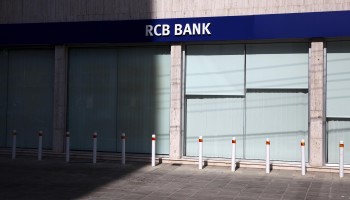After the release of the investigative committee report, Minister Harris Georgiades tweeted that he has taken on political responsibility for the country’s economy “every day for six years” and that he should be judged by those results.
“We had been called on to manage a chronically toxic situation,” the Cyprus Mail quoted him as saying. He added that the “government’s decisions have secured confidence and stability, have bolstered the Cypriot economy through consecutive upgrades, (and they) have ensured growth prospects.”
The bank was nationalized with €1.7 billion (US$1.9 billion) in taxpayer money after the Cypriot economy collapsed in 2013.
Depositors at Bank of Cyprus, the island’s largest lender, saw 47.5 per cent of their uninsured deposits converted into equity in 2013 as part of the terms of Cyprus’s cash-for-reforms package aimed at helping overcome a twin fiscal and banking crisis. Those at Laiki Bank, then second largest, lost all their deposits in excess of €100,000 when it went out of business and its operations were taken over by Bank of Cyprus.
Then Nicholas Hadjigiannis was appointed as the bank’s chairman and later became CEO, but the bank collapsed in 2018 and it's healthy operations were sold to Hellenic Bank for which European regulators approved $3.9 billion of state aid as a guarantee to Hellenic Bank.
A special government commission was established to investigate what led to the bank's collapse. The commission’s mandate had to be extended twice, and eventually lasted eight months.
The commission’s report labels the minister’s role in the bank’s collapse “severe.” It finds him responsible for the appointment of the bank’s senior executives who, it states, were not appropriate and who shared a close personal relationship with the minister.
In particular Hadjigiannis, who had no experience in retail banking, had never held a senior executive position at a bank and never headed a department with a large number of employees, all of which were listed as conditions for the position. The report states that CCB was aware of his lack of credentials during the candidate evaluation.
Hadjigiannis had also previously been disciplined when he served in the Laiki Bank, and as chairman at CCB was criticized in a KPMG audit which made special reference to his managerial style.
In 2015, the bank’s general manager resigned from his post and in a written statement criticized
corporate governance at the bank and Hadjigiannis' involvement, according to the committee’s report. Further still, the finance minister received repeated and severe warnings regarding poor and weak corporate governance at the bank, from both Cypriot and European supervisors.
The report also says that Minister Georgiades did not keep the President of the Republic informed about the problems cited by the supervisory authorities and therefore "the political responsibility for the collapse of (CCB) … is due to the wrongful manipulations and decisions or omissions by the Finance Minister."
The report also lays the blame with President Nicos Anastasiades who "completely silenced the dramatic developments that took place … either because he did not want to have political costs in the run-up to elections or because he wanted to prevent further deposit outflows.”
The commission recommended further police investigations for several senior figures including Hatzigiannis.
The appointment of Hadjigiannis is especially significant because it came after a period of turbulence for the bank that required expert handling.
The bank’s issues were, according to the report, evident since independence in 1960. When a 1981 report’s recommendations went unimplemented the problem continued to grow. The report focuses on the pre-2013 period, but ultimately blames the bank’s collapse on the way it was handled after Hadjigiannis' appointment.
“Undoubtedly, the Co-op came to the brink of collapse in 2013, needing to be bailed out by the state, due to the borrowers’ failure to repay their loans that led to increased capital needs,” the report states. Loans were granted on the wrong criteria and were granted as accounts with unlimited funds and no repayment time frames.
“Wasted money, excessive advertising expenditure, excessive spending on company cars, high limits on company cards and granting them to ineligible people, tens of millions (spent) in purchasing the services of foreign and local experts, recruitment of staff with opaque procedures,” were also cited as reasons for the bank’s collapse.
The committee's report finds it to be a case of “political corruption as defined by a decision of (Britain's) House of Lords decision.” While it is not “money corruption” because “no one took a bribe. No one sought or received money for political favours,” it is nevertheless a less detectable form “and therefore more insidious.”






